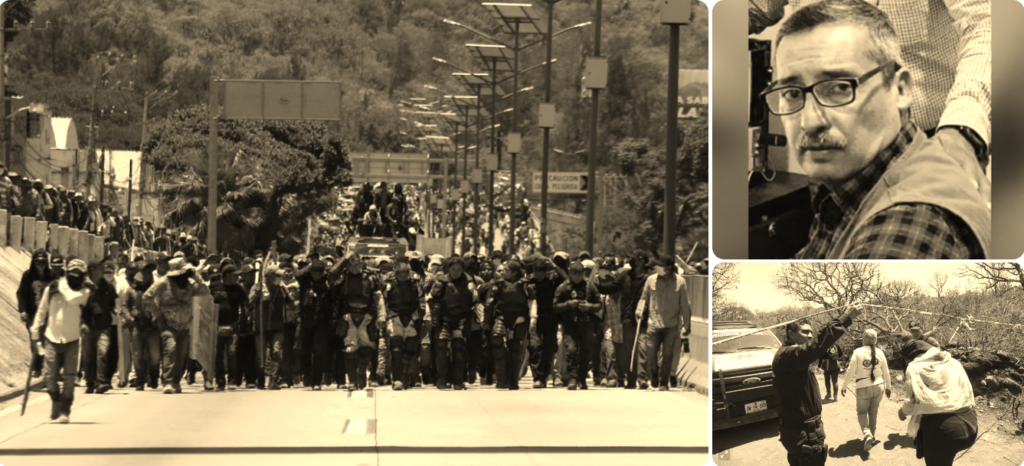
Raúl Romero*
Tuesday, July 5, 2023, in Nayarit, La Jornada correspondent Luis Martín Iñiguez Sánchez goes missing. A few days later his lifeless body is found. Monday, July 10, 2023, in Guerrero, more than 5 thousand people, identified as the social base of the local cartel Los Ardillos, take over the city of Chilpancingo and kidnap police and officials to demand the release of a transportation boss. On Tuesday, July 11, in Jalisco, municipal and state police are ambushed and at least six people are killed and 12 others injured by buried explosive mines. In Mexico today, as we wrote in our last issue (https://n9.cl/e1dmfo), we are unfortunately in a context of war.
In order to understand the war we are living in Mexico, it is necessary to understand the old and new modalities in which they develop. In the literature on the subject, there is talk of fourth generation warfare, hybrid warfare, full spectrum warfare, total warfare, etcetera. Wars are not only waged in the armed arena or overtly, but also covertly or in low-intensity, media, economic and commercial warfare. The armies of national states are now also integrated as regional militias -always at the service of the financial centers- or strengthened with private troops, such as those of organized crime. The aim continues to be the elimination and subjugation of the adversary, but above all the control of the territory and its reorganization to guarantee profits for the occupying force.
Although the current Mexican administration has abandoned its warmongering rhetoric, in fact it has reinforced the use of military forces to intervene in this war scenario, providing them with legal certainty, social legitimacy, economic power and possession of infrastructure. These measures, together with the use of other concepts such as national security, make it clear that the military will only leave the barracks in times of war.
In the war we are experiencing in Mexico, legal economic corporations are involved in disputes over territories and natural resources. These corporations count on the forces of the State to guarantee security in the plundering of minerals, water and other common goods. The armed forces join in this work as a construction company, occupying and reorganizing territories to make them useful to capital. Whether from transnational or national companies, private or from the State, the conquest, reorganization and administration of territories to put them at the service of capital is one of the characteristics of this war.
Another of the actors involved in the current conflict in Mexico are the illegal economic corporations, organized crime and its armed groups that have presence and control in various branches of the national economy. These groups have impressive economic, political and armed strength. They are capable of building their own armored cars, of financing political campaigns or imposing candidates, and have firepower and technology capable of confronting sections of the Army, of exploding car bombs, of disappearing thousands of people, of filling the country with clandestine graves and much more. Criminal corporations have acquired a presence in the cultural industry and many aspects of daily life, to the extent that they are, for many social sectors, a source of employment, a reference of social mobility and even a model of success.
Legal and criminal corporations are strongly intertwined, not only in aspects such as money laundering or political territorial control, but also in the use of services. In Chicomuselo, Chiapas; in Aquila, Michoacán, and in other regions of the country, mining companies acquire the services of armed organized crime groups to impose their business. Depopulating territories and eliminating resistance are also part of the objectives of the ware.
In Chiapas, this war for territory waged by legal and criminal corporations is coupled with an old counterinsurgency war that the Mexican State left in place against the Zapatista peoples by means of paramilitary groups, corporatism and social programs. It is in Chiapas where the wars that have been tested in other regions of the world, such as Colombia, are being combined for the conquest and territorial reorganization of a geopolitically crucial zone, seasoned by the drama of migration that is well-known in the south of Europe and for other illegal cross-border businesses, and aggravated by the counterinsurgency war that has not stopped.
The war in Mexico finds a fundamental point in Chiapas. There a struggle is already being waged in which the peoples are betting on life with peace, justice and dignity. Zapatismo is an outpost of that struggle, that is why we must all demand a stop to the war against the Zapatista peoples, which is at the same time the cry for a stop to the war in Chiapas and in all of Mexico.
* Sociologist
Original text published in La Jornada on July 18th 2023. https://www.jornada.com.mx/2023/07/18/opinion/012a1pol
English translation by Schools for Chiapas.
